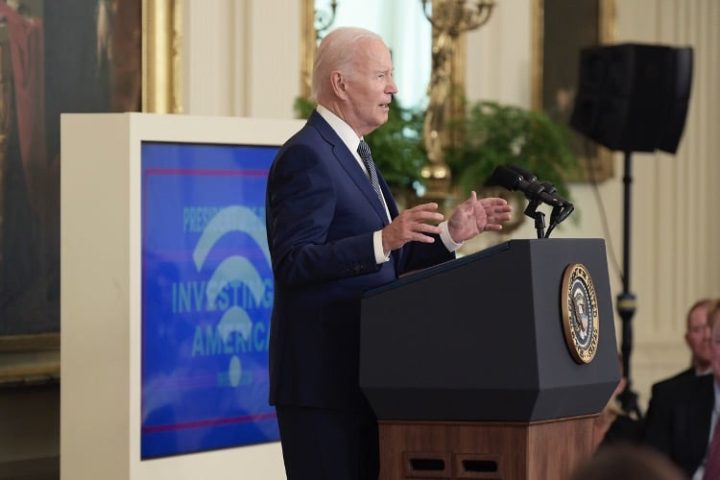
Claiming that “high-speed internet is no longer a luxury — it is necessary for Americans,” President Biden announced on Monday a major investment of over $42 billion to expand affordable high-speed internet access to all Americans, in “50 states, DC, and the territories” by 2030.
Speaking on the broadband investments at the White House, Biden stated:
It’s the biggest investment in high-speed Internet ever, because for today’s economy to work for everyone, Internet access is just as important as electricity was or water or other basic services.
For around 24 million Americans across this country, there is no high-speed Internet. And for millions more, their Internet connection is limited or unreliable.
High-speed Internet isn’t a luxury anymore; it’s become an absolute necessity. That’s why we acted as soon as we did — as soon as we came to office — with the American Rescue Plan.
A Department of Commerce (DOC) press release stated the $42.45 billion funding is part of the “Broadband Equity, Access, and Deployment (BEAD) program from President Biden’s Bipartisan Infrastructure Law to administer grant programs within their borders.”
“What this announcement means for people across the country is that if you don’t have access to quality, affordable high-speed Internet service now — you will, thanks to President Biden and his commitment to investing in America,” said Secretary of Commerce Gina Raimondo. “Whether it’s connecting people to the digital economy, manufacturing fiber-optic cable in America, or creating good paying jobs building Internet infrastructure in the states, the investments we’re announcing will increase our competitiveness and spur economic growth across the country for years to come.”
The White House fact sheet shared these highlights:
- Awards range from $27 million to over $3.3 Billion, with every state receiving a minimum of $107 million.
- 19 states received allocations over $1 billion with the top 10 allocations in Alabama, California, Georgia, Louisiana, Michigan, Missouri, North Carolina, Texas, Virginia and Washington.
- With these allocations and other Biden administration investments, all 50 states, DC, and the territories now have the resources to connect every resident and small business to reliable, affordable high-speed internet by 2030.
(Full details available here)
States, D.C., and territories (Eligible Entities) will need to apply for the grant funding through the DOC describing how they propose to run their grant programs. Once approved, the eligible entities can begin awarding grants to telecommunications companies and broadband providers to build infrastructure to provide high-speed internet.
The concept of providing high-speed internet access to all, regardless of where one lives, sounds great, but in reality, will be a difficult task to achieve by 2030, if ever. Current major broadband companies have had difficulty providing high-speed internet access in rural and sparsely populated areas due to infrastructure costs, as well as the few subscribers to such services in those areas.
Avoiding the obvious expense and ongoing infrastructure requirements to achieve his goal of high-speed internet access for all Americans by 2030, Biden chose to use the announcement opportunity as another 2024 reelection campaign speech.
Biden declared:
For decades — for decades — and the middle class was hollowed out. Too many good-paying manufacturing jobs moved overseas. Public investment was slashed. Core sources of our economic strength, like infrastructure, manufacturing, and innovation, were also hollowed out.
The president then rambled on about the failure of “trickle-down economics” while attacking the wealthy and big corporations, before he shared his memorized campaign talking points and his vision of building “the economy from the middle out and the bottom up instead of the top down; to grow the economy by educating and empowering workers, by promoting competition to support small businesses, and investing in ourselves again for the first time in a long time.”
To add to Biden’s broadband announcement, according to The Epoch Times, a memo (pdf) was released at the same time, in which “senior White House advisers Anita Dunn and Mike Donilon compared the broadband expansion to President Franklin Roosevelt’s efforts in 1936 to bring electricity to rural America.”
The memo shared, “just like Franklin Delano Roosevelt delivered electricity to every home in America through his Rural Electrification Act, the announcement is part of President Biden’s broader effort to deliver investments, jobs, and opportunities directly to working and middle-class families across the country.”
The White House staff memo focused on Biden’s supposed successes of his first two years in office, with the administration’s policies leading the way, while sharing that Bidenomics is working.
“The President’s economic strategy has powered the strongest recovery of any major economy in the world. Among leading economies, the United States has had the highest economic growth since the pandemic and currently has the lowest level of inflation. This progress wasn’t inevitable or an accident — it has been a direct result of Bidenomics,” the memo stated, before announcing that Biden will “deliver a major speech in Chicago” on Wednesday “to highlight how his strategy of growing the economy by growing the middle class is delivering for the American people.”
The timing of Biden’s broadband investment announcement and the memo reveals that this was more about the president’s 2024 reelection campaign than whether all Americans will actually have high-speed internet access by 2030. Only time will tell.




